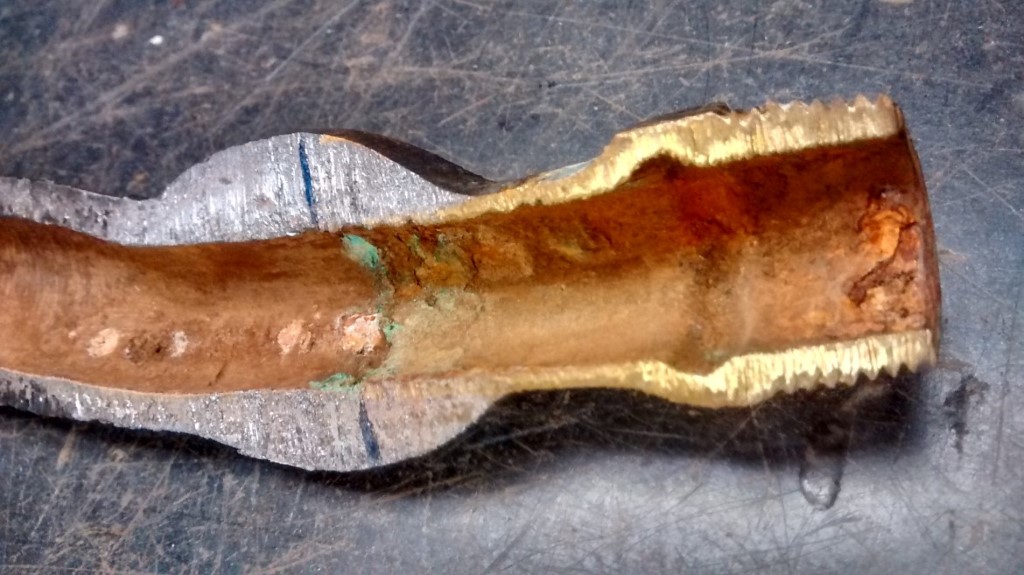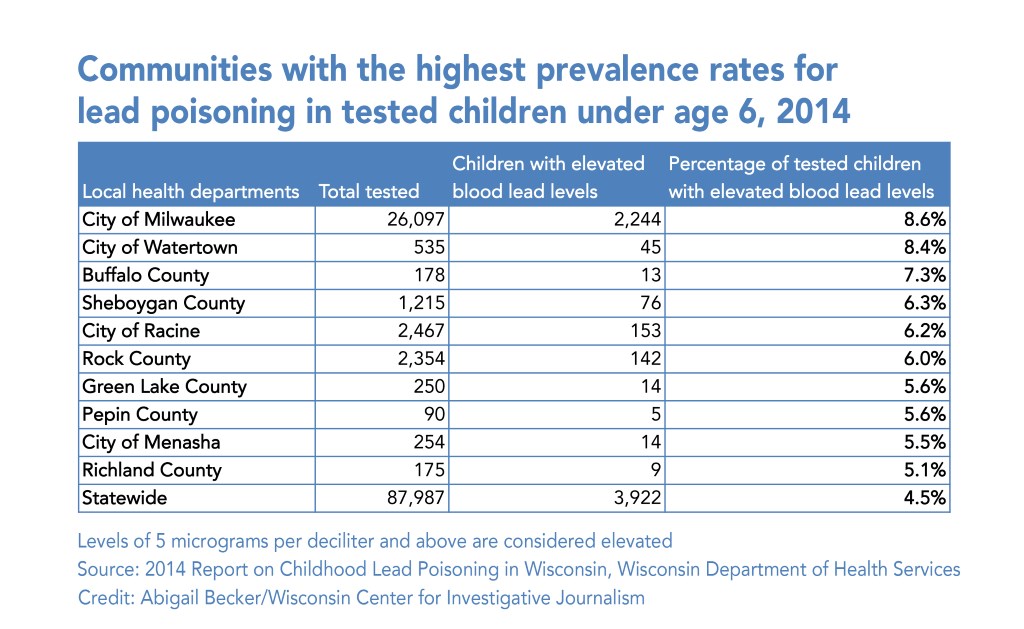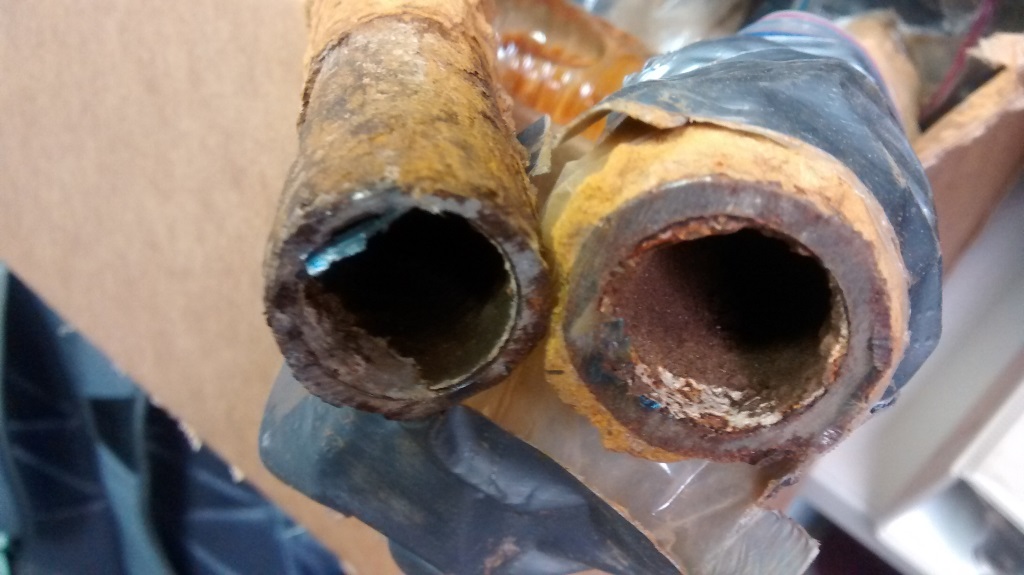Bill Requires Testing Tap Water for Lead
State has 176,000 lead service lines that can taint water. Flint situation cited.

Lead from corroded pipes, such as this one taken from a building in Flint, Michigan, caused blood lead levels in children in this impoverished city to spike, creating a public health crisis. A proposal in the Wisconsin Legislature would require that drinking water be tested as a source of contamination when a child is lead poisoned. Photo by Siddhartha Roy of the FlintWaterStudy.org.
Two Democratic lawmakers from Madison and Milwaukee are proposing a bill that would require the state to conduct tap water testing when a child is lead poisoned. The measure also would lower the level at which the state would be required to investigate the source of lead in a child’s blood.
Current law requires the Wisconsin Department of Health Services to investigate paint, dust and soil as sources of lead and then only when the blood lead level of a child is 15 or 20 micrograms per deciliter or higher, depending on the testing method, according to the bill draft.
Madison Rep. Chris Taylor and Milwaukee Rep. LaTonya Johnson began circulating a draft of the bill Friday. It would lower the level requiring an investigation to 5 micrograms per deciliter or higher, which is the definition of lead poisoning used by the federal Centers for Disease Control and Prevention. In 2014, nearly 4,000 Wisconsin children registered at those levels.

Casheous, then 9 months old, examines his finger after a test that showed the level of lead in his blood was more than three times the federal threshold for poisoning. His mother, Crystal Wozniak, has become an advocate for blood testing children for lead, which can cause lower IQ and behavior changes. Photo courtesy of Crystal Wozniak.
The measure also calls for an additional $500,000 for lead investigations. One hurdle to passage could be the $20 million limit that Gov. Scott Walker has proposed on additional spending this session.
The public health crisis in Flint, Michigan, has demonstrated the dangers of lead-tainted drinking water. Lead is a powerful neurotoxin that can cause permanent brain damage, including lowered intelligence and criminality in adulthood. A study of Milwaukee schoolchildren tied behavior problems in school to high blood lead levels.
“These levels are in rural, suburban, urban. They’re in Republican communities. They’re in Democratic communities,” Taylor said. “We really need to address this issue all over the state.”
Taylor said her proposal comes in response to the Wisconsin Center for Investigative Journalism’s ongoing Failure at the Faucet series, which found that tap water is rarely investigated as a source of lead poisoning despite the well-known risks of drinking water from plumbing containing lead. The lawmaker said she discovered that Wisconsin’s approach was out of date with federal CDC standards.

State Rep. Chris Taylor, D-Madison, on Friday announced she plans to introduce a bill with Rep. LaTonya Johnson, D-Milwaukee, that would require the state Department of Health Services to test drinking water when a child is lead poisoned. Photo by M.P. King of the Wisconsin State Journal.
“We require three times the poisoning of children before there’s a requirement that the environment be looked at by DHS,” she said. “That’s just way too high. That’s serious, serious lead contamination.
“What our bill does is to try to get it (standard) updated, it but it also says you have to test for lead in the paint and the water.”
Taylor said she is not sure how many investigations are currently conducted by DHS, and agency spokeswoman Stephanie Smiley was out of the office Friday afternoon.
The Center also found that Wisconsin has at least 176,000 lead service lines leading to homes and buildings. In addition, many older homes have internal plumbing containing lead, including faucets, solder and pipe connections.

Communities with the highest prevalence rates for lead poisoning in tested children under age 6, 2014.
Milwaukee has about 70,000 lead service lines. Nearly 2,200 children in Milwaukee — or 8.6 percent of those tested — had elevated blood lead levels in 2014, according to the most recent figures available. Statewide, the percentage was 4.5 percent. Madison is thought to be the first major city in the nation to replace all of its lead service lines with copper.
The crisis in Flint was sparked in part by a doubling of the percentage of lead poisoned children to 4.9 percent of those tested, an increase tied to lead that leached from pipes after the city’s new water source was not treated with anti-corrosives.
Last month, Milwaukee informed state agencies that it planned to halt replacement of water mains in portions of that city because such work has been shown to dislodge lead from service lines, causing dangerous spikes in drinking water.

Lead from corroded pipes in Flint, Michigan, is partially to blame for a public health crisis in the impoverished community. After the city switched its drinking water source in 2014 to the highly corrosive Flint River, there was a spike in lead poisoning among Flint’s children. A bill circulating in the Wisconsin Legislature would require tap water testing whenever a child is lead poisoned. Photo by Siddhartha Roy of the FlintWaterStudy.org.
In a statement announcing circulation of the bill, Johnson said she had witnessed the devastation that lead can cause for children under the age of 6 whose developing brains are most susceptible.
“I ran a child care for some of Milwaukee’s poorest families for 10 years, and have seen firsthand the heartbreaking damage that lead wreaks upon a young child,” Johnson said. “Wisconsin needs to take Flint’s crisis as a wake-up call.”
She said unless the state steps in, children will be “poisoned and have their lives forever diminished.”
The nonprofit Wisconsin Center for Investigative Journalism (www.WisconsinWatch.org) collaborates with Wisconsin Public Radio, Wisconsin Public Television, other news media and the UW-Madison School of Journalism and Mass Communication. All works created, published, posted or disseminated by the Center do not necessarily reflect the views or opinions of UW-Madison or any of its affiliates.
Tainted Water
-
Fecal Microbes In 60% of Sampled Wells
 Jun 12th, 2017 by Coburn Dukehart
Jun 12th, 2017 by Coburn Dukehart
-
State’s Failures On Lead Pipes
 Jan 15th, 2017 by Cara Lombardo and Dee J. Hall
Jan 15th, 2017 by Cara Lombardo and Dee J. Hall
-
Lax Rules Expose Kids To Lead-Tainted Water
 Dec 19th, 2016 by Cara Lombardo and Dee J. Hall
Dec 19th, 2016 by Cara Lombardo and Dee J. Hall


















I find it surprising that led in your water could cause criminality in adulthood. It would be interesting to read about the research people did to find that out. Getting your water tested annually seems like a more appealing idea after learning about some of the consequences.